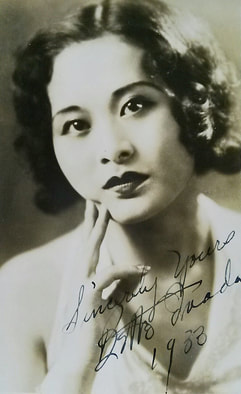|
Lately I’ve been thinking about the first wave of musicians that popularized Hawaiian music in Japan. Most were American-born Japanese nisei looking for somewhere they could fit in. It’s a sad story that spans the Pacific. It is a story that rarely gets talked about.
Recently I bought an old Victrola phonograph and have been buying old 78s from the first half of the 20th century so I can hear the music as it originally sounded. On Ebay I found a copy of “Sue City Sue” recorded in 1948 by Buckie Shirakata and his Aloha Hawaiians with Betty Inada on vocals. I learned about Buckie while researching an article I wrote for Ukulele Magazine and just had to have the recording. Although I can’t tell you why, in 1945 “Sue City Sue” was a hit for its author Dick Thomas and then successfully covered by Gene Autry, and Bing Crosby. It’s not a particularly catchy tune and the lyrics are pedestrian. By the time Buckie and Betty released it in ’48, “Sue City Sue" went through a cultural transformation. The Japanese lyrics paint a familiar picture: boy meets girl and a saucy bird sings “chu-chu-chu”. The rest is history. The Japanese version has nothing to do with Sioux City or Sue at least until after Buckie’s steel guitar solo when Betty sings “Sue City Sue” in her native English. That’s what I like so much about this recording. It’s bicultural. Buckie, best known for playing steel guitar not ukulele, fronted one of the most successful Hawaiian bands in Japan. Buckie, born and bred in Hawaii, arrived in Japan in 1933 at age 21 with a time on his hands and music in his heart. More to the point, there were few places that would hire a young Japanese-American. So he packed up his band and took a gap year with his Aloha Hawaiians. The band recorded two Hawaiian songs before returning to Hawaii to finish college. In 1937 Buckie returned to Japan, got married and settled in Tokyo. From then on his band was named “Buckie Shirakata and the Aloha Hawaiians”. Betty Inada the US-born daughter of Japanese immigrants a year younger than Buckie Shirakata, grew up in Scramento, California. She was beautiful, headstrong, and talented when she arrived in Japan, also in 1933. If there were few options open for Buckie, there were less available for Betty. In the 1930s headstrong young Japanese women generally weren’t appreciated. Now chances are good that Buckie and Betty’s paths would have crossed in ’33 but we’ll never know. It wasn’t until after the war that they collaborated on “Sue City Sue” and others. That generation of Japanese-Americans had it hard. They were viewed as neither Japanese nor American by either country. If they had stayed in the USA they would have been placed in relocation camps. But as fate would have it, both were in Japan when the Pacific War broke out and were forced to make a living singing forbidden foreign songs at a time when both countries questioned their allegiance. Buckie and Betty kept singing throughout the war years, Buckie slyly rebranding his Hawaiian tunes as “southern” Asian tunes using Japanese words. By the time “Sue City Sue” was released in Japan in ’48 Japanese wanted no more than to forget the recent horrors of the war and Betty and Buckie had a hit. They restarted their careers with mixed success. Buckie stayed in Japan, released multiple Hawaiian albums at a time when Japanese needed dreams of tropical, carefree south sea islands. During the war Betty married a Japanese film star who she later divorced. Betty remarried, moved to Los Angeles and returned only twice to Japan to perform her old songs. For a more detailed look at the fates of Japanese-Americans during the war years I recommend Midnight in Broad Daylight, by Pamela Rotner Sakamoto. The book traces the fortunes of the Fukuhara family before and after WWII. Some family members sent to Japan to complete their education became stuck there during the war years. One son fought for the Imperial Japanese Army while another remaining in the US was sent to a relocation camp and then enlisted in the US Army and returned to Japan in the occupying forces. Sadly, some family members died of radiation sickness after the bombing of Hiroshima.
2 Comments
7/9/2020 04:47:59 am
This is definitely what messing around is. If we can talk to people about what it is all about, then we can better. I think that it used to be hard to do this, but now, social media is here. We can use the internet to get closer to lots of people, and that is what I love about all of this. I will try to use my social media to let people understand the things that I want to talk about.
Reply
Leave a Reply. |
AuthorI'm an amateur ukulele player who happens to be fluent in Japanese. I hope that I can inspire you to learn more about the ukulele, Japan, or better yet, BOTH! Archives
February 2021
Categories |

 RSS Feed
RSS Feed